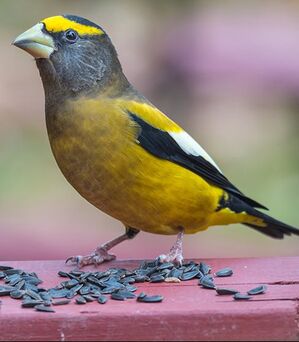 Do I eat where I poop? Do I eat where I poop? Follow these handy tips for dealing with sick or dead birds at the feeder. Sick birds are still showing up at feeders all across the country. Mainly these are Pine Siskins ill with Salmonella, a bacterial infection. Salmonella can be passed to baby birds from their parents. The species most vulnerable are the smaller finches, like pine siskin and goldfinch, but red crossbills and other birds can also get this disease. Salmonella spread is stopped through disinfecting or removing feeders, and using feeders that are less likely to spread disease. Note that contamination happens as soon as a sick bird lands on a feeder. Basics and Instructions for Cleaning, Feeder Suggestions: *1) If you have a sick bird - remove the feeders for a week or two. Take found sick birds to a rescue. *2) If you have had sick birds, switch to feeders less likely to spread disease - mesh hanging types or hoppers with very narrow feeding trough. Remove feeders that allow a bird to poop into the food! Isolate species by feeding foods specific for the species, see below. *Continue feeding ONLY if you are able/willing to keep the feeders cleaned and disinfected, and able to do this frequently. Fecal matter and saliva are how this disease is spread. Salmonella survives freezing, and hot temps, and lasts a long time in the environment. Bleach is necessary (not vinegar!). Instructions below. *If you are seeing more than one or two sick birds, please change your feeders as they are likely spreading disease. See below. Please explore the instructions below. 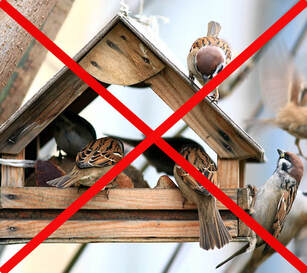 If birds can poop onto the food, then they are contaminating the food. If birds can poop onto the food, then they are contaminating the food. What to Do Now: Sick or Dead Birds:
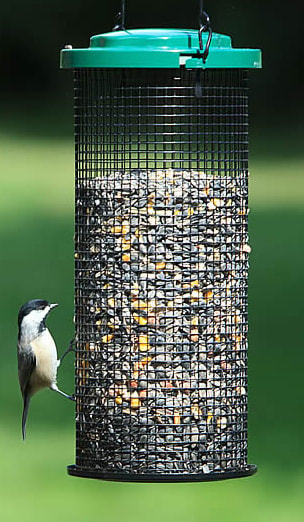 Use feeders that let birds poop on the ground. Cut off seed-catchers, use mesh feeders, hoppers with narrow feeding areas. Use feeders that let birds poop on the ground. Cut off seed-catchers, use mesh feeders, hoppers with narrow feeding areas. Feeder Tips:
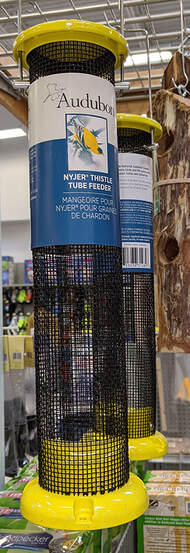 Food Choice:
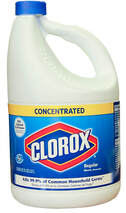 Cleaning Feeders:
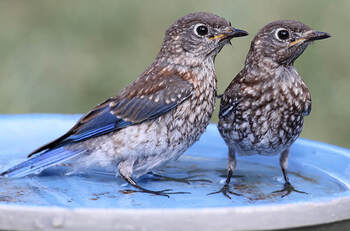 Baths & Water Features
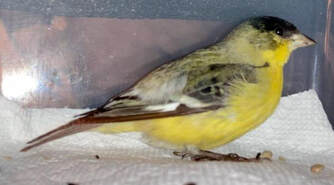 Signs of Salmonella: Symptoms: Main sign is a bird sitting listless and not moving. Salmonella causes lesions and inflammation through the digestive track and esophagus. It enters the bloodstream and then organs and brain. Once in the brain it causes mental issues, which is why sick birds act "tame" and they do not fly away. Birds ultimately die from either starvation, since salmonella lesions impair digestion, or organ failure.
What do we do if we find a sick or dead bird?
Living, but sick birds:
Can humans or pets get Salmonella? Yes, but it is not likely. The amounts in bird feces are tiny, and we are large. Cats that eat birds can and do get it. But if you have outside cats, you shouldn't be feeding birds. Chickens carry their own particular subspecies of Salmonella. It too can be spread to wild birds. In fact, agricultural animal waste is one source of Salmonella infection for wild birds, particularly those associated with those animals (starlings and house sparrows). Please use common sense when handling sick or dead birds, and when cleaning your feeders and baths. Gloves are mandatory. If you would like citations for the research mentioned, email us at lovenativebirds@gmail.com Why Pine Siskins & Finches?
Pine Siskins are particularly susceptible to Salmonella infection. The finch species experienced an "irruption" year in 2020, which is when an unusually large number of a species appears in areas further outside of their range. This trend seems to be continuing, and is likely caused by a shortage of conifer seeds. (Audubon has a nice article on this irruption). You might wonder why the Pine Siskins are ill, while the Chickadees and Nuthatches are seemingly fine. The finch family of birds seems to be more susceptible to both Salmonella and Conjunctivitis. This family includes Pine Siskin, House Finch, Evening Grosbeak, Red Crossbill, and the Goldfinches. Raptors and Owls that prey on sick birds also contract the disease. Notably, this disease was spread from agricultural poultry farms, and more birds who congregate near agricultural animals carry the infection. A few birds will carry the bacteria in their guts, without visible external symptoms. These asymptomatic carriers will shed the bacteria in their feces; if this fecal matter contaminates foods, like at a feeder, then the disease will spread. Some birds are able to overcome the disease and gain enough immunity to survive. This is usually the larger birds, like the Evening Grosbeak. Dr. Wesley Hochachka of Cornell Lab of Ornithology speculates that, "many other species are innately more able to fend off Salmonella infections," and develop immunity. However, given the death rate, he notes that it doesn't appear that this is happening for the Pine Siskin and Redpoll. How & What Diseases are Spread? Birds share disease wherever they congregate and avian scientists confirm that bird feeders are a location in which disease can be passed to other birds (Adelman et al. 2015; Dhondt et al. 2007; Galbraith et al. 2017; Hernandez et al. 2012, Lawson et al. 2018). Many diseases are spread through fecal-oral transmission (meaning the birds accidentally eat poop). Any feeder in which a bird is able to sit in their food is a potential source for infection. Flat feeders and those with large seed catchers are primary culprits. Salmonella is just one of several pathogens that can be spread at the bird buffet. Others are: conjunctivitis, avian pox, aspergillosis, trichomoniasis, and coccidia, along with internal parasites, mites, and feather lice. However, not ALL birds carry these pathogens (just like not all people carry the cold virus). In fact, studies show that only a few birds actually carry the Salmonella bacteria. Salmonella is highly contagious because it survives in the environment (say a bird feeder) for a long time- "several weeks in dry environments and several months in wet environments" (FDA). In contrast, Conjunctivitis survives from "hours to a few days" according to Dr. Hochachka. Humans can reduce disease spread by keeping their feeders clean. Our role in helping these birds is simple. We can create an environment in which the birds have a safe environment to feed. Comments are closed.
|
AboutNative Bird Care's is celebrating its 10th anniversary! Our main focus is song, shore, and waterbirds. We offer specialized care and facilities for these extraordinary birds.. Archives
January 2024
Categories
|
 RSS Feed
RSS Feed